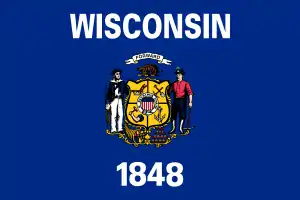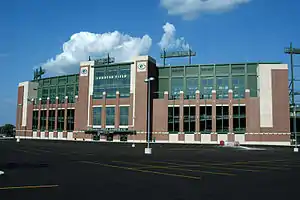History of the Arena Football League in Milwaukee
The Milwaukee Iron were announced as an af2 expansion team in March 2008 when the team's ownership group announced a three-year lease agreement to play at the Bradley Center beginning with the 2009 season. The announcement came the day before the Milwaukee Bonecrushers kicked off play in the Continental Indoor Football League at Milwaukee's US Cellular Arena.
Milwaukee had been without an arena football team since the Milwaukee Mustangs of the Arena Football League folded in 2001 after not being allowed to play at the Bradley Center.[1]
Milwaukee Mustangs (1994–2001)
The team was founded in August 1993, when Andrew Vallozzi was approved by the league for expansion.[2] The city of Milwaukee became football hungry, after renovations to Lambeau Field led to speculation that the Green Bay Packers would soon stop playing games in Milwaukee, something they'd been doing since 1933. Later that year, the Packers would confirm the rumors and announced that their December 1994 contest at Milwaukee County Stadium would be their last.
For many in the Milwaukee area, the Mustangs helped fill the void left by the Packers. The team never finished lower than eighth in seasonal attendance, regularly drawing in the 14,000's and 15,000's (at a time when average attendance was approx. 8,500). The Mustangs even led the AFL in attendance in 1996.
After the 2001 season, the Mustangs lost their lease at the Bradley Center. When it was unable to find a replacement facility, the league folded the team.[3] Milwaukee was left without an arena football team until 2008, with the formation of the Milwaukee Bonecrushers of the Continental Indoor Football League, who played their home games at the U.S. Cellular Arena. A year later, the Milwaukee Iron began play in the Arena Football 2 League across the street at te Bradley Center. In January 2011, it was announced that the Milwaukee Iron, now of the Arena Football League would be changing its name to the Milwaukee Mustangs.[4]
Milwaukee Mustangs (2009–2012)
The Iron played its first game on Thursday, March 12, 2009, a 60-0 exhibition shutout of the New Zealand Overstayers at the Bradley Center.[5] They opened the regular season on Friday, March 27, 2009 when they played host to the Iowa Barnstormers. The Iron lost 60–38.[6]
The Iron entered the Arena Football League in 2010.[7] The team finished the year 11–5 and won the Midwest Division.
The team changed its name to the Mustangs on January 27, 2011. The name "Mustangs" was chosen as it was the name of the original franchise that existed from 1994 to 2001. The team's dancers were called the Fillies. The Mustangs were covered locally by WAUK (540 ESPN MILWAUKEE) and Time Warner Cable Sports 32.
On October 2, 2013 the AFL announced that an ownership group led by Portland businessman Terry W. Emmert has been approved by the AFL's Board of Directors to purchase a majority of the Milwaukee Mustangs and relocate the team to Portland, Oregon. The team began regular season play as the Portland Thunder in 2014 at the Moda Center (20,636), home of the NBA's Portland Trail Blazers.[8]
See also
References
- "New team has lease agreement". 2008-03-20. Archived from the original on 2008-06-11. Retrieved 2008-03-22.
- Andy Olson (August 10, 1993). "Milwaukee franchise will join indoor league for 1994 season". The Milwaukee Journal. Retrieved November 5, 2013.
- Don Walker (November 22, 2001). "Mustangs won't field an arena team in 2002". Milwaukee Journal Sentinel. Retrieved August 6, 2014.
- Don Walker. "Iron will be Mustangs". Milwaukee Journal Sentinel
- "Milwaukee Iron Reminders for Monday, March 2, 2009". oursportscentral.com. February 27, 2009. Retrieved March 24, 2016.
- "Milwaukee Iron Team Schedule". 2009-07-24.
- "ARENA FOOTBALL IS BACK FOR THE 2010 SEASON". 2009-09-28.
- "Arena Football to Return to Portland in 2014".




